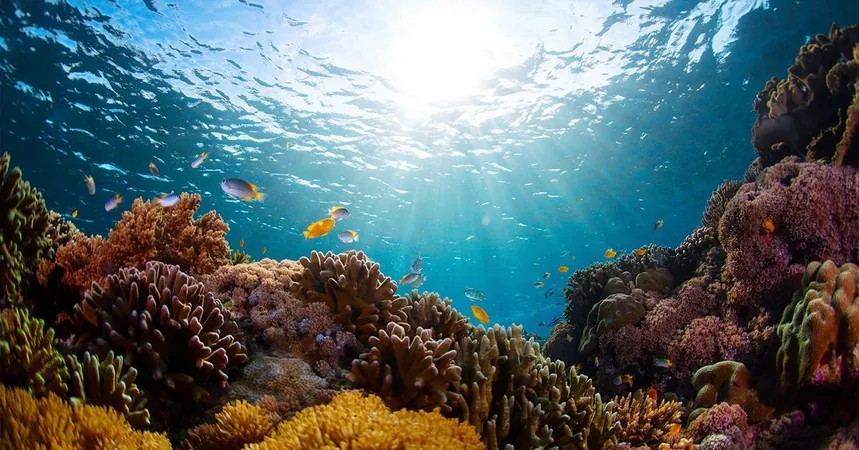
Microbial Solutions to Climate Change: Scientists Urge Global Action at COP29
2024-11-13
Author: Arjun
Introduction
In an urgent and unprecedented appeal, a coalition of microbiologists has called on global leaders to harness the power of microbes to combat climate change. This initiative, published simultaneously in 24 leading scientific journals, coincides with the outset of the United Nations Climate Change Conference, COP29, taking place in Baku, Azerbaijan.
Urgent Call for Action
Jack Gilbert, a microbiologist at UC San Diego’s Scripps Institution of Oceanography and the senior corresponding author of the report, emphasizes that the dire consequences of climate change on our environment, public health, and economy necessitate a swift and robust scientific mobilization akin to the global response witnessed during the COVID-19 pandemic.
"The time for isolated efforts has passed,” Gilbert stated. “A coordinated global approach is essential to unlock the potential of microbes as allies in our fight against climate change. We aim to mobilize policymakers, industry, and the broader community toward this urgent goal."
The Role of Microbes in Climate Regulation
The potential role of microbes in regulating climate is critical yet often underestimated. These microorganisms are essential in biogeochemical cycles, influencing greenhouse gases' emission, capture, and transformation while managing carbon dynamics in both terrestrial and aquatic ecosystems. From humans to corals, a healthy microbiome is vital for nutrient acquisition and combating disease.
Innovative Microbial Solutions
In the report, researchers, including co-lead author Raquel Peixoto from King Abdullah University of Science and Technology, outline six innovative "vaccine-type" solutions that could be quickly advanced. These include:
1. Carbon Sequestration Boosters
Utilizing microbes to facilitate the storage of carbon in soils and oceans, contributing to reduced atmospheric CO₂ levels and promoting healthier crops.
2. Methane Mitigators
Introducing specific bacteria to landfills to lower methane emissions, which can also be applied in agricultural settings and natural wetlands.
3. Microbial Bioenergy
Developing biofuels from algae, yeast, and other organic materials to replace fossil fuels.
4. Pollution Decomposers
Employing microbes to cleanse industrial waste, aiding the restoration of contaminated land and water bodies.
5. Microbiome Optimization
Altering cattle diets to decrease methane production.
6. Fertilizer Innovation
Utilizing naturally occurring bacteria in place of synthetic nitrogen fertilizers to enhance both air and water quality.
Significance of Microbial Strategies
Gilbert asserts that these microbial strategies, if adopted, could prove to be significant tools in the fight against climate change, stating, "Deploying these innovations at a global scale can mitigate the climate crisis while boosting ecosystem resilience."
Establishing a Global Task Force
The report advocates for the establishment of a worldwide climate task force founded on scientific principles to expedite the implementation of these microbial technologies. This body would seek dedicated funding, foster cross-sector partnerships, and ensure thorough safety assessments are conducted.
Emergency Communique
The synchronized publication in numerous microbiology and Nature journals serves as an emergency communique, calling for immediate, actionable solutions to the climate emergency. Notable journals involved include *mSystems, ISME Journal, Sustainable Microbiology*, and *Nature Communications*.
Participation in COP29
As COP29 unfolds, Peixoto will actively participate in discussions, including a presentation on Marine Conservation Strategies and a United Nations side event titled "Ticking Clock- Climate Change Accelerating." These platforms aim to showcase the potential of microbiology in addressing climate challenges and the importance of collaborative global efforts.
Conclusion
As the climate crisis intensifies, the call for innovative microbial solutions intertwines with global responsibility, offering hope that nature’s tiniest allies can make a monumental difference in shaping a sustainable future.


 Brasil (PT)
Brasil (PT)
 Canada (EN)
Canada (EN)
 Chile (ES)
Chile (ES)
 España (ES)
España (ES)
 France (FR)
France (FR)
 Hong Kong (EN)
Hong Kong (EN)
 Italia (IT)
Italia (IT)
 日本 (JA)
日本 (JA)
 Magyarország (HU)
Magyarország (HU)
 Norge (NO)
Norge (NO)
 Polska (PL)
Polska (PL)
 Schweiz (DE)
Schweiz (DE)
 Singapore (EN)
Singapore (EN)
 Sverige (SV)
Sverige (SV)
 Suomi (FI)
Suomi (FI)
 Türkiye (TR)
Türkiye (TR)